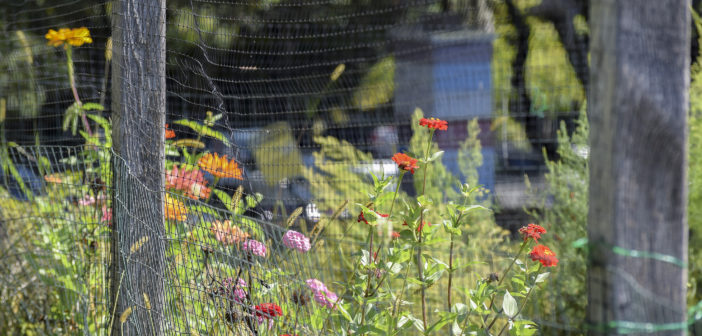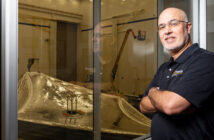On a chilly January morning, Jeff Tkach, chief impact officer at the Rodale Institute, was minding his own business when his boss, Jeff Moyer, got an interesting phone call about setting up an organic farm on land owned by the Pocono Raceway. Moyer knew that he needed to bring someone with the business acumen to complete the job, so he grabbed Tkach, his right-hand man.
“Jeff is always willing to take a risk with me,” Moyer said. “Within a matter of hours, we came up with some really amazing opportunities – not just for us, but for the community.”
Over the last three years, the project has grown into one of the largest regenerative organic farms in North America, said Mike Mooney, chief marketing officer at Pocono Organics.
The Rodale Institute, where Tkach works, is an organization that does research in organic farming.
A major health collapse in 2015 caused Tkach to transition from working at Rodale’s for-profit publishing house to its nonprofit research arm, he said. That’s when he decided to dedicate his life to the advancement of regenerative organic agriculture, and he hasn’t looked back since.
When Tkach first got sick, he said he saw six doctors and spent $50,000 on medical testing before receiving a diagnosis: Lyme disease.
Although most cases of Lyme disease clear up with a short course of antibiotics, it’s an unsettling diagnosis as symptoms of post-treatment Lyme disease syndrome can last over 20 years. Tkach said he’s still experiencing symptoms six years after contracting the disease.
“It was the worst and best thing that ever happened to me,” Tkach said. “It set me on an incredible path – and, a path, by the way, that I’m still on. I have to work really hard every day to stay healthy.”
That’s when he said he was first introduced to Dr. Scott Stoll, a Lehigh Valley, plant-based, functional medicine doctor.
“We’re going to have to farm your body back to health,” he remembered Stoll saying.
Eating a whole-food, plant-predominant diet and living a holistic lifestyle not only taught Tkach to take better care of himself but also the world, he said.
“I’ve begun to see that my body is an ecosystem and, the better I treat myself, the healthier I feel,” Tkach said. “Farming is no different – it’s all about giving the soil what it needs to be healthy. If you do that, it will take care of you.”
In his current position, he’s responsible for Rodale’s outward-facing operations. He said his goal is to position the institution as a global thought leader, expanding the impact of its research on farmers and consumers locally and around the world.
“Jeff really buys into our mission,” Moyer said. “It’s his understanding that fuels his passion for the health of people, the environment, and our work at [Rodale].”
The impact that Tkach said he hopes to make is two-pronged: there’s the human health piece – teaching people that agriculture is the foundation of wellness – and the climate piece – because we can only be as healthy as our environment.
“Globally, people recognize that this has to change,” Stoll said. “But it’s not just healthcare, not just the food on the plate, (it’s) the interconnected dynamics of how food is produced that causes us to be healthy.”
According to Mooney, disseminating that information through community projects emphasizing collaboration is where Tkach shines.
Rodale is involved in the local community through its strategic partnerships, various farmer training programs and the organic farm they helped build at St. Luke’s hospital.
“We want Rodale to be a center for innovation in the Lehigh Valley and for the world,” Tkach said.
Some of the food is produced by students who train at the Institute’s main campus. The food is brought into downtown Allentown and sold to residents through a program that accepts food stamps, Tkach said. That way, the valley’s residents most in-need can access a healthy harvest.
“What I really appreciated (about Tkach) was his sense of relationships being the priority and how we should reach beyond the farm to bring other people into our story,” Mooney said. “His sincerity, his authenticity; he’s someone that, when you meet him, you just know – this is someone I can trust.”
Research conducted at the Institute has contributed to farmers using compost instead of fertilizer, planting cover crops that support soil health and responsibly managing pasturelands leading to less carbon in the air and more carbon in the ground, Moyer said. He explained that regenerative organic agriculture doesn’t just suspend disease or improve quality of life – it’s an investment in human health for generations.
When it comes to supporting human health, Tkach said, farmers are right up there on the front lines with doctors.
“Our founder, (J.I. Rodale), believed that ‘healthy soil equals healthy food equals healthy people,’ and he was totally right.”






Comment policy
Comments posted to The Brown and White website are reviewed by a moderator before being approved. Incendiary speech or harassing language, including comments targeted at individuals, may be deemed unacceptable and not published. Spam and other soliciting will also be declined.
The Brown and White also reserves the right to not publish entirely anonymous comments.
6 Comments
I got some unique and valuable information from your article. Thankful to you for sharing this article here. Why Organic Farming is Gaining Popularity Today?
Great timely article
Nice post
The information seen on this site will be important to use in a new article I’m publishing. Congratulations to the authors of the page.
undoubtedly it is very informative and valuable content. Everybody will learn and share your content . this type of content we want next time again
It is very helpful content. Waiting to get more updates from you.
Nice
The information seen on this site will be important to use in a new article I am publishing. Congratulations.